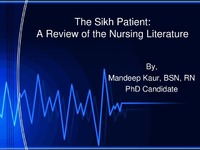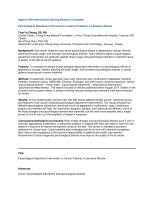The Sikh patient: A review of the nursing literature
View File(s)
Visitor Statistics
Visits vs Downloads
Visitors - World Map
Top Visiting Countries
| Country | Visits |
|---|
Top Visiting Cities
| City | Visits |
|---|
Visits (last 6 months)
Downloads (last 6 months)
Popular Works for Kaur, Mandeep by View
| Title | Page Views |
|---|
Popular Works for Kaur, Mandeep by Download
| Title | Downloads |
|---|
View Citations
Citations
Introduction: Nearly a half million Sikhs currently live in the United States. Thus, gaining cultural competency on caring for a Sikh when they become patients under our care, is a clear progression. This study examines research publications conducted in the United States, Canada and the United Kingdom and mirrors them to US society as a means to better describe nursing care of the Sikh patient.
Methods: This review of the literature was conducted by searching the keyword "Sikh" in the CINAHL and MEDLINE databases. The initial search retrieved 415 article results. Criteria for including an article was discussing care of primarily Sikhs within the US, Canada or UK. Exclusion criteria included articles focused primarily on other major religions or not within the countries of interest. Finally, after all criteria for review were met, approximately 28 research articles were included.
Results: Preliminary findings show that very little literature has been published about Sikhs as patients for care, or how a healthcare professional may enhance their cultural sensitivity to treating a Sikh patient. Of the literature that has been published, there is an overall consensus on the cultural adaptations for caring for Sikh patients. Many of the studies reviewed showed the importance of the religion in the healthcare recovery process. The findings include every aspect of care from birth customs to palliative care, and how the Sikhs diverge from the majority in each of these scenarios. Nursing implications are directly discussed in a large portion of these studies. These include understanding the extended family model, differences in food and lifestyle, and the importance of spirituality.
Conclusion: All in all, the Sikhs are a unique and individual minority group in the United States. Learning the norms, beliefs and values of the Sikhs is vital to providing culturally competent or sensitive care to this growing portion of American society.
41st Biennial Convention - 29 October-2 November 2011. Theme: People and Knowledge: Connecting for Global Health. Held at the Gaylord Texan Resort & Convention Center.
Items submitted to a conference/event were evaluated/peer-reviewed at the time of abstract submission to the event. No other peer-review was provided prior to submission to the Henderson Repository, unless otherwise noted.
| Type | Presentation |
| Acquisition | Proxy-submission |
| Review Type | Abstract Review Only: Reviewed by Event Host |
| Format | Text-based Document |
| Evidence Level | N/A |
| Research Approach | N/A |
| Keywords | Sikhs; Review; Sikhism |
| Name | 41st Biennial Convention: People and Knowledge: Connecting for Global Health |
| Host | Sigma Theta Tau International |
| Location | Grapevine, Texas, USA |
| Date | 2011 |
All rights reserved by the author(s) and/or publisher(s) listed in this item record unless relinquished in whole or part by a rights notation or a Creative Commons License present in this item record.
All permission requests should be directed accordingly and not to the Sigma Repository.
All submitting authors or publishers have affirmed that when using material in their work where they do not own copyright, they have obtained permission of the copyright holder prior to submission and the rights holder has been acknowledged as necessary.
Related items
Showing items related by title, author, creator and subjects.
-
Impact of real-time prediction model-enhanced clinical decision support systems on nursing sensitive patient outcomes: A review of the literature
Jeffery, Alvin Dean (2016-03-17)Session presented on Saturday, July 25, 2015: Background: The popularity of 'big data' along with an increasing capacity for real-time predictive analytics to augment clinical decision support systems (CDSS) within electronic ... -
Psychological adjustment intervention in cancer patients: A literature review
Chiang, Ting-Yu; Chen, Shu-Ching (2018-06-29)Anti-cancer treatment impact on appearance image and cause body image change and psychological distress and generated poor quality of life. In clinical care, exercise, appearance modification, mindfulness program or website ... -
Attitude of prognostic disclosure to terminal cancer patients: A systematic review of the literature
Hsu, Tsui-Hsia; Li, I-Chuan (2016-03-17)Session presented on Saturday, July 25, 2015: Background: Informed consent is not easy to cancer patients, especially for in the Chinese culture. In developed countries, patient autonomy is important including terminal ... -
Physical activity, prevention of functional decline and support of mobility in older hospitalized patients: A literature review
Schneider, Iris Tamara; Meyer, Gabriele (2016-03-21)Session presented on Monday, November 9, 2015: Purpose: Physical activity is the basis for participation and social life. Older hospitalized patients are prone to decline of physical activity and functional status. ... -
Factors affecting self-management behaviors of patients with chronic obstructive pulmonary disease: A literature review
Li, Ching Ching; Lee, Diana T. F.; Leung, Doris Y. P. (2014-11-17)Session presented on Saturday, July 26, 2014: Purpose: To review factors affecting self-management behaviors of patients with chronic obstructive pulmonary disease (COPD). Methods: Ten electronic databases AMED, BNI, ...





